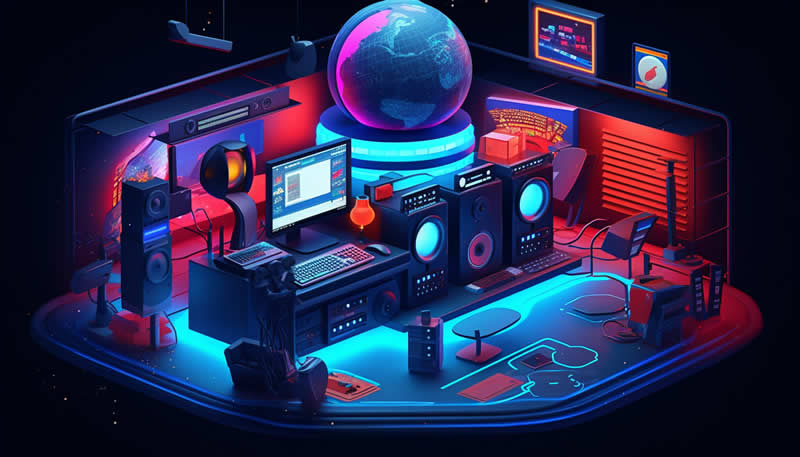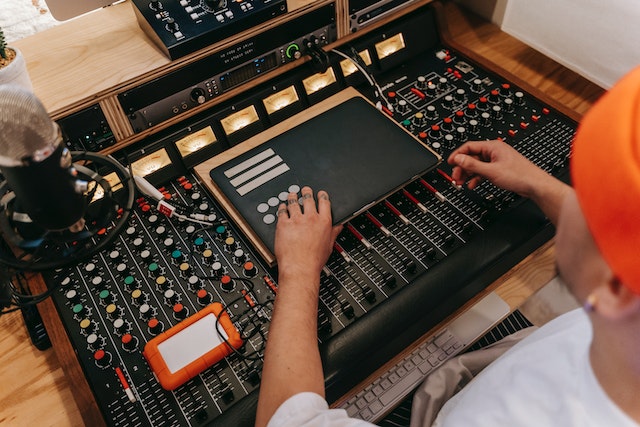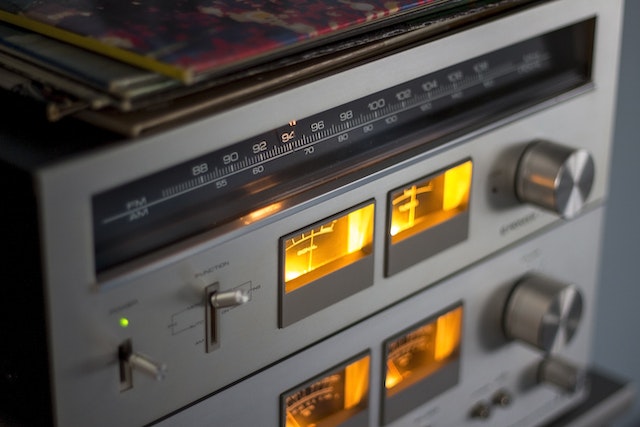Why college radio stations are still relevant in music promotion

Table of content
Why college radio stations are still relevant in music promotion - Introduction
College radio stations have long been an essential launchpad for new talent, especially indie artists. These platforms have consistently championed undiscovered artists, launching them into fame.
Their existence might seem unusual in today's world of digital music streaming, but their role in music promotion remains relevant. They serve as a treasure trove of new sounds, often promoting musical diversity overlooked by algorithm-driven platforms.
Despite the dominance of digital platforms, college radio stations continue to thrive, celebrating unconventional sounds and promoting fresh talent.
This article will delve into the unique world of college radio and its importance in music promotion.
Whether you're an aspiring artist, a music marketer, or a curious reader, we hope this exploration underscores the enduring impact of college radio on the music we discover and love. So, let's dive in.

KEY TAKEAWAYS
College radio stations remain pivotal in promoting indie artists, emphasizing artistic integrity over commercial potential.
These stations have helped launch bands like REM, Nirvana, Arcade Fire, The Black Keys, and The Arctic Monkeys, fostering talent and building relationships.
College radio's promotion of new music is driven by a deep appreciation for diversity, not trending charts or advertising revenue.
These stations attract a diverse audience, facilitating a direct-to-fan business model and improving fan retention.
Amidst technological advances, college radio has adapted to maintain relevance, reaching a global audience while continuing to promote diverse and emerging music.
The influence of college radio stations
The impact of college radio stations in the music industry might not be apparent at first glance, but a deeper look reveals their fundamental role in shaping the careers of artists and the trends of music itself.
These stations offer a unique platform where new and emerging artists get their first spins, often long before they gain mainstream recognition.
Here, in these hallowed hubs of creativity, music isn't defined by commercial potential alone. Instead, the emphasis is on artistic integrity, originality, and the power of music to connect people.
Success stories of college radio exposure
College radio has long been a launching pad for countless artists, granting them the invaluable gift of exposure at the start of their careers.
A perfect example is the band REM, who owe much of their initial exposure to college radio airplay. Similarly, artists like Nirvana, Arcade Fire, and The Black Keys all enjoyed early support from college radio.
This just goes to show how impactful these stations can be in shaping the musical landscape and ushering in the next wave of influential artists.
Think about The Arctic Monkeys, an indie music band. Their ascent to popularity is an excellent illustration of how college radio can help performers.
As unknowns, the Sheffield-based band was initially picked up by several college radio stations in the UK and the US, which helped them gain early recognition.
The exposure allowed them to reach a larger audience and to make a significant impression in the music industry. The band credits their music elevator pitch, which was well received by the college radio jockeys, as a significant part of their initial success.
This is a reminder of how college radio stations are not just about playing music; they're about building relationships, fostering talent, and giving music that may otherwise remain unheard, a chance to touch the hearts of listeners.
The unique role of college radio in music promotion
In the expansive and ever-evolving music industry, college radio stations hold a unique position. Unlike commercial radio stations, college radio is not confined by rigid playlists and commercial pressures.
Their DJs, often students themselves, take pride in hunting for fresh sounds from undiscovered artists, presenting a platform for indie artists that is both genuine and deeply personal.

For those interested in getting their music into the hands of these dedicated DJs, our guide on how to submit music to radio stations offers invaluable advice.
In this environment, the discovery and promotion of new music is not dictated by trending charts or advertising revenue, but by a profound appreciation for music in its varied forms.
This approach to music promotion highlights the importance of finding unique and authentic platforms like college radio stations to reach a broader audience.
Comparison of college radio promotion to other types of music promotion
When comparing the promotional value of college radio with other platforms such as mainstream radio, social media, or streaming services, unique characteristics become apparent.
Mainstream radio and popular streaming platforms often prioritize established artists or algorithm-friendly tunes. Social media, though a powerful tool for publicity, can be an unpredictable platform, often dictated by the whims of viral trends.

In contrast, college radio offers an arena where indie artists can be heard purely for their musical prowess, fostering a community of listeners eager for authenticity and innovation over mainstream popularity.
This platform provides an ideal space for artists to develop and showcase their unique brand. As discussed in our article on branding your music, creating a distinct identity is crucial for artists, and college radio offers a stage for such identities to be shared and celebrated.
Moreover, this grassroots approach to music promotion resembles the tactics described in our guide on guerrilla music marketing which emphasizes authenticity and direct connection with the audience over high-budget, mass-marketing techniques.
Analysis of the demographic reach and appeal of college radio
While college radio stations might seem to be tailored for a younger, college-age demographic, their appeal is broader than one might think.
The inclusive nature of these stations, coupled with their mission to showcase a vast array of music styles, attracts a diverse audience and enables artists to reach a broader audience than they might on more traditional platforms.

From the eager college student to the seasoned music enthusiast seeking an alternative to mainstream tracks, college radio's reach is as diverse as the music it promotes.
The intimacy of the connection that college radio facilitates between artists and listeners provides an excellent foundation for direct-to-fan business model in the music industry.
This allows artists to build and nurture a strong bond with their audience, creating a community of loyal fans around their music.
Additionally, the personal and authentic interaction that these stations provide can significantly improve fan retention as listeners often feel a strong connection to the music and artists they discover on these platforms.
This unique relationship between artists, radio stations, and their listeners plays a vital role in the sustained growth of a dedicated fan base.
The impact of technological advancement on college radio
As the world of music entered the digital era, college radio stations found themselves navigating uncharted waters. The surge in online music platforms and the omnipresence of the internet have drastically altered how we consume music.
These changes, mirroring broader impacts of technology on music, have led to significant shifts in the way we discover and engage with new music.
However, college radio has proven resilient and adaptive. Instead of fading into obsolescence, these stations have embraced the challenge, evolving to remain a vital part of the music ecosystem.
In response to these technological advances, college radio stations have adapted with remarkable agility and resilience.

They've done this by complementing their traditional broadcast formats with online streaming, creating interactive websites, and engaging with listeners through social media.
This digital presence has helped college radio reach beyond local campuses and into the global music community.
The central principles, however, remain unchanged: the commitment to promoting emerging artists, fostering a love for diverse music, and creating an authentic and personal music experience.
Streaming platforms and college radio stations often serve different purposes and reach different audiences, but they can work together to serve the broader music ecosystem.
College radio continues to be a discovery platform for new artists, many of whom find their music included in playlists on streaming platforms as a result of initial radio exposure.
Simultaneously, the extensive libraries of streaming services offer radio DJs an even broader array of music to introduce to their audiences.
As technology continues to shape the music industry, college radio's tenacity and adaptability ensure that it remains a vital, dynamic force within the evolving landscape of music.
The spirit of discovery, diversity, and community that has always defined college radio now connects with the global audience in a way that was never before possible.

The future of college radio and music promotion
Looking to the future, it's evident that college radio stations will retain a unique role in the music promotion landscape.
As our world becomes increasingly digitized, and algorithm-based music recommendations become the norm, the value of handpicked music curation provided by these stations is in sharp relief.
Like a breath of fresh air, these stations break through the digital noise with their authentic offerings.
And measuring the success of music promotion efforts isn't only about digital metrics; the impact of college radio in connecting music with listeners in a meaningful way is a crucial part of the equation, something we delve deeper into in our piece about measuring promotion success.
College radio also plays a significant part in nurturing a dynamic and diverse music community. The stations have a history of promoting a wide range of genres, from the mainstream to the obscure.
They often take risks on new artists and unconventional music that commercial stations might overlook, fostering a culture of musical exploration.
By continuing to champion the unheard and the underrepresented, college radio stations will remain vital in cultivating a rich tapestry of music for listeners worldwide.

However, challenges persist for these stations in the world of music promotion. The fast-paced evolution of the digital music scene, financial constraints, and competition with streaming services are among the ongoing hurdles.
Addressing these requires a delicate balance between preserving the traditional essence of college radio while adapting to modern listeners' expectations.
As we move forward, let's not underestimate the power of college radio. It is an enduring beacon in the music industry, a platform that stands for diversity, discovery, and the sheer joy of music.
Its legacy and continued influence are testament to its lasting relevance. So, let's tune in and listen, because on college radio, the next big thing in music could be just a song away.
Why college radio stations are still relevant in music promotion - Conclusion
In wrapping up, we reaffirm the essential role of college radio stations in music promotion and gain exposure in music industry.
They stand as a beacon of diversity in an often homogeneous music landscape, continuously championing independent artists and introducing fresh sounds to listeners.
As we gaze into the future, we see college radio continuing to evolve, showcasing the irreplaceable human element in music discovery. Even in an increasingly digital world, their influence and relevance remain intense.
We urge you, our readers, to show support for your local college radio stations. Your involvement will aid in nurturing a vibrant music community.
And remember, for more insights into the music industry, don't forget to check our blog's homepage for a wealth of related articles. Keep the music playing!
Music will save us all,
The CalypsoRoom Team
Frequently Asked Questions (FAQs)
What role do college radio stations play in music promotion?
College radio stations offer an important platform for emerging and indie artists. They often focus on promoting diverse, offbeat, and unconventional music that might be overlooked by mainstream platforms, thereby playing a crucial role in discovering and promoting new talent.
How do college radio stations compete with digital music platforms?
Despite the rise of digital music platforms, college radio stations remain relevant due to their unique focus on human curation over algorithms. They provide an authentic and personalized music experience that many listeners appreciate.
Are college radio stations only for college students?
While based in educational institutions, college radio stations appeal to a wide range of listeners, not just students. Their commitment to promoting diverse music attracts listeners of all ages and backgrounds.
Can college radio stations help me as an indie artist?
Absolutely. College radio stations have a history of helping launch the careers of many successful indie artists. They offer a platform to reach new audiences and gain exposure at the early stages of your career.
How can I get my music played on a college radio station?
Different stations have different processes, but generally, you can submit your music directly to them for consideration. Many also welcome local artists and are eager to support their local music community.
How can I find college radio stations near me?
One of the best ways to find college radio stations is through an online search. Websites like Radio-Locator have databases that allow you to search by location. Additionally, you could visit the websites of colleges and universities near you to see if they have a radio station.
How do college radio stations choose which songs to play?
College radio stations have a lot of freedom when it comes to what they play. Typically, the music director or DJs choose the songs. They often prioritize new, innovative, and local artists who fit within their station's genre. Quality of the music and its relevance to their audience also play major roles.
back
Written by CalypsoRoom Editorial Team
The CalypsoRoom Editorial Team is a skilled and diverse group of writers, researchers, and industry specialists who have access to Calypso's data and information in order to give you broad knowledge about the music industry as well as helpful advice to help you manage your music and dancing career.
Updated May 2023




